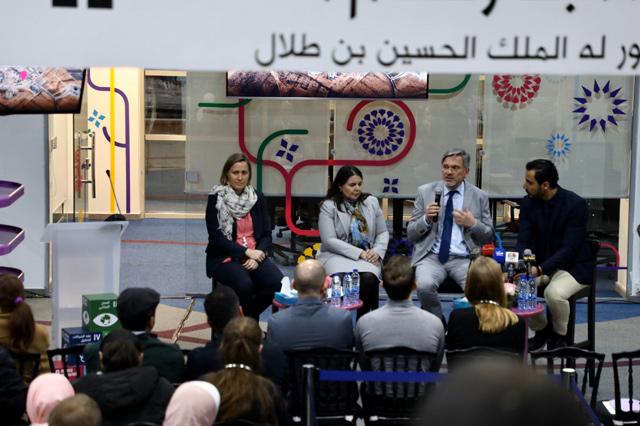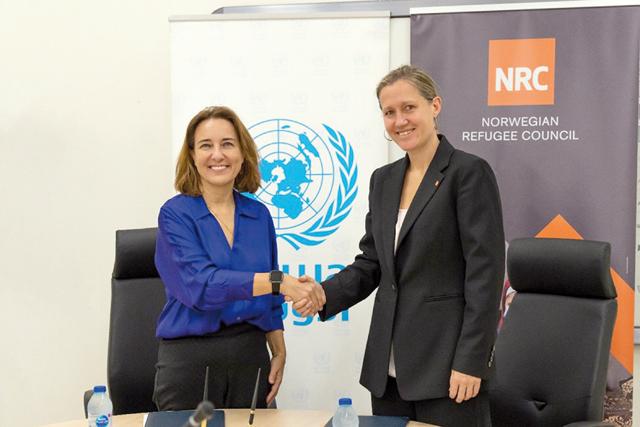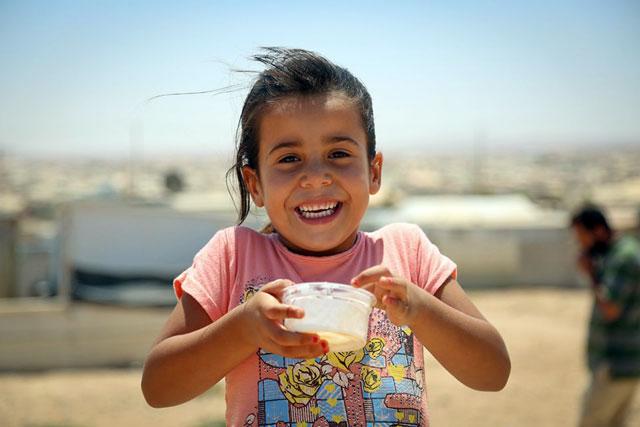You are here
Energy hackathon challenges innovators to devise solutions for development, humanitarian issues in sector
By Balqis Zeidan - Feb 22,2020 - Last updated at Feb 22,2020

UNHCR Representative Dominik Bartsch speaks at the launch of Jordan Energy Hackathon 2020 on Thursday in Amman (Photo courtesy of UNHCR)
AMMAN — Jordan Energy Hackathon 2020 kicked off on Thursday with the aim of finding innovative solutions to development and humanitarian challenges facing the energy sector in Jordan, especially those facing Syrian refugees.
The hackathon, taking place at the Zain Innovation Campus (ZINC) and TechWorks in Amman from February 20 to March 2, is bringing together innovators, entrepreneurs, refugees and various organisations to tackle energy challenges.
At the launch of the hackathon, Norwegian Ambassador to Jordan Tone Allers said that partnerships between humanitarian and development organisations, the private sector and entrepreneurs are key to development.
She added that platforms of collaboration across different sectors allow for the exchange of innovative ideas and expertise, and the fostering of “new and better solutions.”
Majida Assaf, deputy representative of United Nations Development Programme (UNDP) Jordan, said that the hackathon would enable partners to address challenges following a comprehensive approach.
Awareness campaigns tragetting households and consumers would shed light on consequences of energy and electricity consumption, she said.
Highlighting the development programme’s role in introducing innovative solutions, Assaf said that UNDP Jordan’s Accelerator Lab would provide support for bright ideas.
“Access to energy is a basic right,” Norwegian Refugee Council (NRC) Country Director Muriel Tschopp said during the launch.
Despite the welcoming atmosphere provided to refugees in Jordan, she noted, 80 per cent of them live below the poverty line and a refugee family, on average, has JD450 of debt.
Of the refugees interacting with the NRC, 64 per cent say that energy is one of the top four expenses they deal with, Tschopp said, adding that 93 per cent of refugees who get evicted are evicted due to their inability to pay rent or electricity expenses.
Tschopp expressed that the NRC is keen to support the hackathon given its role in tackling immediate and urgent issues for vulnerable people and establishing sustainable energy sources.
For his part, UNHCR Representative Dominik Bartsch said that, although energy is “a critical issue” in host communities where Syrian refugees live, it is also a “vital matter” for 120,000 Syrians living in the Azraq and Zaatari refugee camps.
He noted that refugees living in the camps are provided with electricity through a solar plant that was installed a few years back. The solar plant can supply electricity for the camp for only 11 hours, he added.
Bartsch challenged participants to use innovation to come up with a system that responds to the needs of refugees and presents a fair solution in accessing energy.
The hackathon is witnessing the participation of 105 individuals, 30 teams and 11 companies that expressed interest in sharing innovative ideas to address challenges facing the energy sector, Global Green Growth Institute Country Representative Ahmed Amra said.
Going through training sessions, participants will compete with one another to find suitable solutions to the energy problems, Corporate Entrepreneurship Responsibility Manager at Zain Jordan Faisal Nsour told The Jordan Times.
Zain will provide a JD6,000 prize for the winning teams, as from one to three winners will be selected at the end of the hackathon, Nsour added.
The event is being organised by the Norwegian Ministry of Foreign Affairs, the UNDP, the NRC, the UNHCR, Zain Jordan, the Crown Prince Foundation, the Jordan Entrepreneurship and Innovation Association, the Global Green Growth Institute (GGGI) and Innovation Norway.
Related Articles
AMMAN — The Zain Innovation Campus (ZINC), in partnership with the Ministry of Environment, the UN Development Programme (UNDP) and the UN W
AMMAN — The UN Relief and Works Agency for Palestine Refugees in the Near East Jordan Field Office (UNRWA) and the Norwegian Refugee Council
AMMAN — The Norwegian Refugee Council (NRC) in Jordan continues its support of refugees and vulnerable Jordanians despite global funding cut













